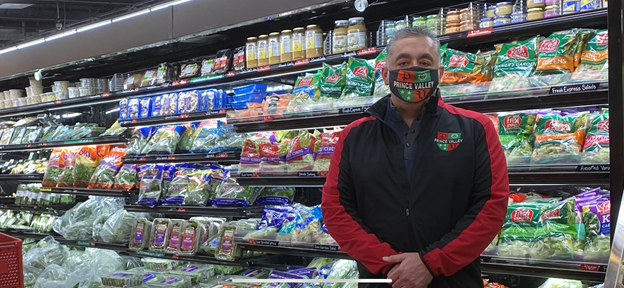What is Essential? A Profile of a Detroit Grocer
People across our food system from farm to fork have been working tirelessly this past year. We talked with Joe Gappy, a Detroit grocery store owner, about his experience during a time defined by uncertainty.
When Michigan went into lockdown in March 2020, Joe Gappy, owner of Detroit’s Prince Valley Market, began logging 60-hour weeks. He managed staffing shifts and worked to keep shelves stocked amidst supply chain disruptions and pandemic purchasing all while reimagining his family’s 45-year-old grocery store.
“The parking lot was full, and the store was jammed with people going up and down all the aisles buying everything we had in the store,” Gappy said. “I realized that something was going on that was bigger than anything I had ever experienced in my life.”

Gappy and his team went to work installing hand sanitizers throughout the store, upping cleanings, sourcing gloves and wet wipes, and implementing other safety precautions.
They also needed to realign the store’s business model. This included shuttering its renowned bakery and pivoting the kitchen from made-to-order items to pre-packaged and grab-and-go foods. This in turn required the purchase of new coolers, hot food cases, and other equipment.
The COVID-19 crisis has upturned nearly every aspect of our lives, not least of which is the system on which we all depend: Food.
Along the way, it has brought about a renewed appreciation for the importance of grocery stores and the frontline workers who have kept our communities fed throughout the pandemic.
This was an unexpected revival. With increasing online competition and a continued shifting of the American diet toward restaurants and prepared foods, neighborhood grocery stores like Gappy’s have seen their already tight margins further stretched in recent years.
Yet as the pandemic eliminated commutes or strained transportation options, many people increasingly relied on stores closer to home. Often family-owned and run, these stores also tend to hire locally and are anchors in their communities.
For stores like Gappy’s this meant being busier than ever. Amidst increased sales and larger deliveries to keep up with demand, Gappy also a saw a jump in SNAP sales as unemployment rates surged. (SNAP stands for the Supplemental Nutrition Assistance Program, formerly known as food stamps.)
At Gappy’s Prince Valley and his other grocery store in nearby Redford, families on SNAP found another benefit: Double Up Food Bucks.
Double Up is a healthy food incentive program designed by national nonprofit Fair Food Network. It matches SNAP dollars spent on fresh fruits and vegetables. This dollar-for-dollar match provides families more food dollars while increasing sales for area farmers through local sourcing commitments. And by attracting new customers with increased purchasing power, Double Up is also a win for store owners like Gappy.
Gappy was one of the first grocery stores in the nation to offer Double Up as the program transitioned from farmers markets, where the idea was born, to the grocery setting.
“Produce is a huge part of our Prince Valley store,” said Gappy, which serves a largely Latinx community in Southwest Detroit. “At first people didn’t believe it. ‘How do you get free produce?’ It’s phenomenal.”
During COVID-19, Fair Food Network pivoted to make Double Up work harder for the families it serves. This included offering Double Up with Pandemic-EBT purchases and lifting the daily cap on Double Up earnings. This helped families earn a Double Up dollar for every SNAP dollar spent on fresh produce (previous limit was $20 a day).
Fair Food Network also fast-tracked the onboarding of new sites and developed a free phone-based app to support online program sign-ups and use. Finally, it launched a statewide marketing campaign to get the word out to SNAP consumers, many of whom were receiving food assistance for the first time in their lives. These pivots, at the height of the COVID crisis, contributed to a doubling of Double Up use in 2020 compared to 2019.
“If you can get more produce to customers who need it yet can’t always afford it, that’s something important that you can do for them, your store, and your community,” Gappy said.







